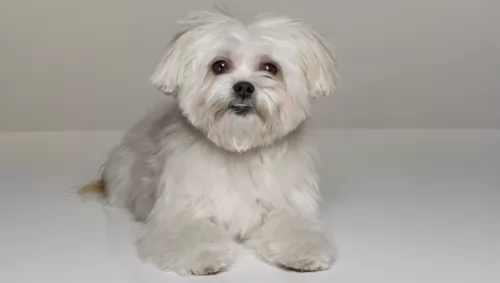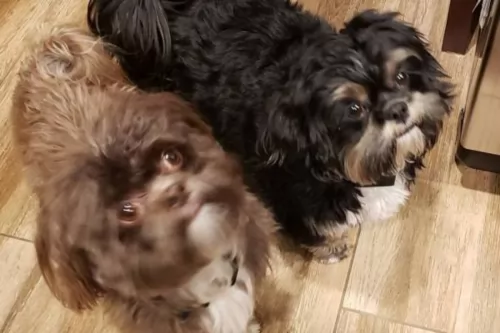 Petzlover
Petzlover Kyi-Leo is originated from United States but Tibetan Terrier is originated from China. Kyi-Leo may grow 11 cm / 4 inches shorter than Tibetan Terrier. Kyi-Leo may weigh 8 kg / 17 pounds lesser than Tibetan Terrier. Both Kyi-Leo and Tibetan Terrier has same life span. Both Kyi-Leo and Tibetan Terrier has same litter size. Both Kyi-Leo and Tibetan Terrier requires Moderate Maintenance.
Kyi-Leo is originated from United States but Tibetan Terrier is originated from China. Kyi-Leo may grow 11 cm / 4 inches shorter than Tibetan Terrier. Kyi-Leo may weigh 8 kg / 17 pounds lesser than Tibetan Terrier. Both Kyi-Leo and Tibetan Terrier has same life span. Both Kyi-Leo and Tibetan Terrier has same litter size. Both Kyi-Leo and Tibetan Terrier requires Moderate Maintenance.
 The Kyi-Leo first came about in the 1950s in San Francisco, USA, with the crossing of two dog breeds – the Lhasa Apso and the Maltese.
The Kyi-Leo first came about in the 1950s in San Francisco, USA, with the crossing of two dog breeds – the Lhasa Apso and the Maltese.
Because this is a mixed-breed dog, it isn’t recognized by the American Kennel Club, but it is recognized by some of the other dog associations such as the American Rare Breed Association or ARBA as it is known. Today the dog is looked upon as a designer breed.
 The Tibetan Terrier is a medium-size breed of dog that originated in Tibet. He has always been kept as a pet and companion for Tibetan monks.
The Tibetan Terrier is a medium-size breed of dog that originated in Tibet. He has always been kept as a pet and companion for Tibetan monks.
He is still a popular companion dog, more so because he is thought to be hypoallergenic, so that even allergy sufferers can enjoy a canine friend.
This isn't a new dog breed, and if you have to go according to records, they have been around for more than 2000 years as herding dogs.
The first Tibetan Terrier was brought to Europe in 1922. The first Tibetan Terriers in the US were imported in 1956 and in 1973 the American Kennel Club recognized the breed. They're classified as a non-sporting breed.
 The Kyi-Leo is a small dog standing at 20 – 30cm in height and weighing in the region of 4 – 6kg.
The Kyi-Leo is a small dog standing at 20 – 30cm in height and weighing in the region of 4 – 6kg.
He has a long, silky coat which is essentially black and white or grey/silver and white or even gold and white. He has frail legs which can become injured or broken in vigorous rough and tumble games.
You can certainly describe the Kyi-Leo as a sweet, quiet, non-aggessive playful dog, and for anyone who wants a splendid pet and companion, this dog makes a great family pet and he won’t cost you an arm and a leg to feed either.
He also has an acute sense of hearing and this turns him into an excellent ‘alarm’ watch-dog. It is also a dog, that while he will love to join you on a walk, he isn’t a dog that is going to demand a lot of exercise.
He responds well to his human family, is easy-going and gentle, tending to be cautious around strangers. You can trust him to be an awesome playmate for children. In this instance, it’s the children who should be warned when playing with a dog like this as, because of his fragile build, he could easily be injured by children who haven’t been taught to respect animals.
Even though he is such an amicable pet, it will still be of benefit to you and him to have him trained and socialized. Then he responds well to basic commands such as sit, stay and lie-down.
Dogs who spend time with their family, pick up on the ‘culture’ of the family and they learn how to behave. Dogs who are left on their own and never socialized can become nervous and aggressive towards people as they never got to learn how to behave – they weren’t socialized.
 The Tibetan Terrier is a medium-sized dog weighing about 8 – 14kg and standing at about 35 – 41cm in height.
The Tibetan Terrier is a medium-sized dog weighing about 8 – 14kg and standing at about 35 – 41cm in height.
People liken him to the Bearded Collie in looks. The long, shaggy, double coat of the dog is available in a number of colors such as white, grey, golden, black or tri-colored.
The dog is powerful and squarely built with floppy ears and a tail that is well feathered, long and carried curled over the back.
He has always been a dog kept by Tibetan monks. There is nothing aggressive about this dog at all and he is sweet, reserved, gentle and sensitive while also being playful and social with his human family.
These dogs thrive on human companionship and are often used as therapy dogs. He is energetic and active and will require regular exercise. He is able to adjust to life in the city or the countryside, but wherever he is, his exercise needs can never be neglected.
 The Kyi-Leo is everything you want in a family companion – active, playful, loving, gentle, happy and balanced.
The Kyi-Leo is everything you want in a family companion – active, playful, loving, gentle, happy and balanced.
He loves his human family but tends to be a little bit wary around strangers, gradually warming to them.
He may be small, but he is robust and alert, and he is also capable of making you a good watchdog.
The Kyi-Leo is an all-round great little pet to have.
 Tibetan Terriers are loyal ad devoted to their human family. They’re social dogs and won’t do well stuck in the back yard.
Tibetan Terriers are loyal ad devoted to their human family. They’re social dogs and won’t do well stuck in the back yard.
They are sensitive dogs, being able to sense the mood of those whom they love. They also make good watchdogs. They’re ideally suited to people who can give them the attention they crave, making splendid pets and companions.
 Your Kyi-Leo is such a feisty, robust little dog who is not likely to cost you much in terms of health care. With his frail legs, it is a good thing to know that you need to be careful with him in terms of back-and joint problems.
Your Kyi-Leo is such a feisty, robust little dog who is not likely to cost you much in terms of health care. With his frail legs, it is a good thing to know that you need to be careful with him in terms of back-and joint problems.
There are actually knee joint issues which are fairly common in small dogs, one of which is patellar luxation.
This is where the kneecap pops out of the thighbone, causing the dog to skip or hop. Some joint issues are genetic and may require surgery. Make sure to keep your pet’s weight under control to remove additional stress on the joints.
This is another dog illness you want to be careful with. Acute pancreatitis -inflammation - is when the condition comes on suddenly while chronic pancreatitis is when pancreatitis occurs over a period of time.
With acute pancreatitis in dogs you’ll see symptoms such as vomiting, abdominal pain, tremors and reluctance to eat. Pancreatitis can be brought on by too much fat, especially rancid fat, some anti-biotics, a low protein diet or a sickness such as diabetes.
If you suspect pancreatitis in your dog, get him as quickly as possible to the vet.
 Your Tibetan Terrier can live to be between 10 and 14 years of age but even so it is susceptible to a host of health problems. Some of the problems you may have to contend with are hip dysplasia, eye problems and heart murmurs.
Your Tibetan Terrier can live to be between 10 and 14 years of age but even so it is susceptible to a host of health problems. Some of the problems you may have to contend with are hip dysplasia, eye problems and heart murmurs.
This is a serious condition where the femur doesn't fit snugly into the pelvic socket of the hip joint. It can be painful and cause lameness even. Dogs that have hip dysplasia most certainly shouldn't be bred.
Heart murmurs are extra heart vibrations. This is because of a disturbance in the blood flow so as to produce an audible noise.
Sometimes the sound is barely audible but it can also be louder and your pet can show signs of congestive heart failure such as coughing, not being able to tolerate exercise, and being lethargic and weak.
 The Kyi-Leo doesn’t require vigorous exercising. One walk a day will keep them happy. There are pet owners who believe dogs can be permanently outside dogs where they can do their own exercise.
The Kyi-Leo doesn’t require vigorous exercising. One walk a day will keep them happy. There are pet owners who believe dogs can be permanently outside dogs where they can do their own exercise.
Everybody who knows dogs, knows they are social creatures who will simply lie at your backdoor just waiting for some response from their beloved human family. Every dog, regardless of breed or size, needs exercise and interaction with their humans every day.
Dogs left alone in the yard day after day are loney, frustrated and bored, and when they start digging or barking, irresponsible owners will ill treat them. These kind of people should never own a dog.
The Kyi-Leo has a sensitive stomach so he’ll need good quality food to avoid digestive problems. Ideally home-cooked food such as softly boiled chicken, brown rice and raw or cooked vegetables added into top quality kibble is the preferred diet.
Fresh, cool water needs to be constantly available.
Brush the long, silky coat at least twice a week to ensure it remains free of knotting. Brushing keeps the coat shiny too.
As a long eared dog, ears should be checked and cleaned regularly too. Air doesn’t reach the inside of their ears and the warm dampness in the ears are a breeding place for infection.
Nails should also be trimmed when they become long because left uncut they can hook onto things causing injury ad pain.
Small dogs are more prone to tartar formation and loss of teeth. You’ll notice that something isn’t right because your lively little dog will be lethargic, he may not want to eat his food and his face may be swollen. When you suspect dental problems, get him to the vet.
 The Tibetan will require good food and exercise to stay healthy. The commercially manufactured dog foods are always a convenient choice, but make sure to give your pet one of the better brand foods, otherwise you feed him a lot of useless ingredients such as fillers, preservatives and colorants from the cheap, inferior brands.
The Tibetan will require good food and exercise to stay healthy. The commercially manufactured dog foods are always a convenient choice, but make sure to give your pet one of the better brand foods, otherwise you feed him a lot of useless ingredients such as fillers, preservatives and colorants from the cheap, inferior brands.
Feed him some home-made food too just to add a little bit of variety to his diet. Boiled chicken, brown rice or pasta and spinach, sweet potatoes and carrots are a healthy choice for your pet.
Avoid people foods such as chocolates, onions, spices, chips etc as these can just upset his stomach and push your vet fees up. Always ensure he has a constant supply of fresh, cool water.
Brush your Tibetan Terrier. He has a long shaggy coat so will require brushing at least twice a week.
Brushing your dog regularly will help to reduce shedding. Many people opt to take the dog to professional groomers and have the coat professionally clipped. The groomers will also trim your dog’s nails and clean the inside of your dog’s ears.
Before you get a dog, make sure you have a reliable veterinarian. It’s no good if your pet becomes ill, maybe even some kind of an emergency, such as bloat, and you don’t know where to take your pet.
You need to be aware of a vet that is open 24/7. Your Tibetan will need to have your vet vaccinate him against some of the deadly diseases there are.